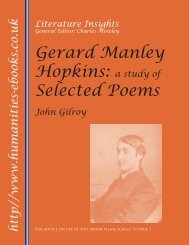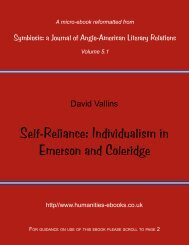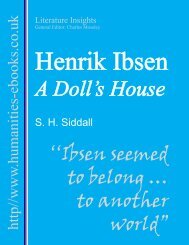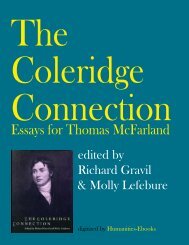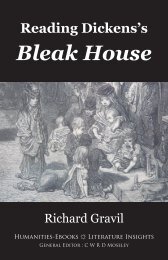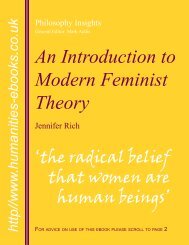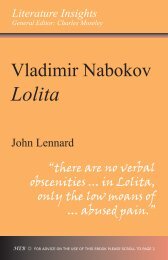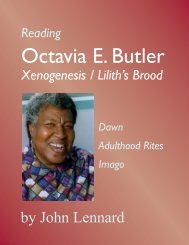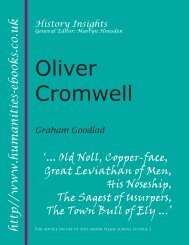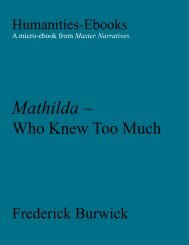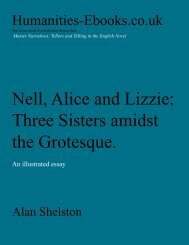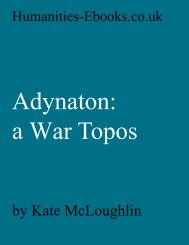William Shakespeare - Humanities-Ebooks
William Shakespeare - Humanities-Ebooks
William Shakespeare - Humanities-Ebooks
You also want an ePaper? Increase the reach of your titles
YUMPU automatically turns print PDFs into web optimized ePapers that Google loves.
Hamlet 11<br />
So there has since 1660 been a particular sensory and intellectual gap, and to meet<br />
<strong>Shakespeare</strong> on his own ground (where he makes fullest, most immediate sense)<br />
modern readers must be aware of auditing as well as spectating, and of the theatreworld<br />
that supported <strong>Shakespeare</strong>’s full, passionate, and successful career.<br />
Perhaps the most obvious thing about that theatre-world is its energy. London was<br />
buzzing, and throughout <strong>Shakespeare</strong>’s career (c.1590–1613) remained the largest,<br />
most innovative city in Europe. Trade, war, expansion, investment—and new ways<br />
of investing—were powerful drivers. England as a whole had also forcibly stopped<br />
an activity that had long been important, and the impulses it had satisfied needed<br />
a new outlet. Under Roman Catholicism theatre was sacred: mystery cycles were<br />
performed in public procession at their time in the liturgical round, while morality<br />
plays taught doctrine and miracle plays celebrated exemplary lives. Many people<br />
acted and very many more audited, so when Henry VIII broke with Rome in 1533 he<br />
couldn’t simply suppress traditions of sacred performance—but the Catholic doctrine<br />
and faith they celebrated could only be a problem for an Anglican monarch, so the<br />
weight slowly came on, and there is no known English performance of a complete<br />
cycle after Coventry in 1574.<br />
That date should give pause, for the mystery cycles and morality plays are often<br />
firmly labelled as mediaeval, as they are in origin—but they were performed into<br />
<strong>Shakespeare</strong>’s lifetime, and he certainly knew about them. Just as importantly, many<br />
people he spoke to, worked with, and wrote for were also familiar with the cycles<br />
and their performance: but in 1575 the cycles were no more, and theatre will out.<br />
The man with the good timing, right idea, and persuasive tongue was James Burbage<br />
(d.1597), and the idea he had was in all fundamentals the modern theatre. What may<br />
most surprise is just how original an idea it was.<br />
Greek theatre, like the mystery cycles, was sacred and classical amphitheatres<br />
part of temple-complexes, while Roman theatre was mostly political, usually a poor<br />
relation of gladiatorial sports, and always a matter of direct patronage and official<br />
subsidy. Travelling players in the middle ages have left no trace of any permanent<br />
stages, so what Burbage wanted in 1576 was radical: a large, purpose-built structure<br />
owned and run by professional actors, to be funded through commercial performances.<br />
Preconditions for such a venture include a sufficiently large and wealthy catchment<br />
area, a workable design for the building, a pool of (would-be) actors, writers able to<br />
<br />
The ‘porter’ scene in Macbeth (2.3) is based on the ‘Harrowing of Hell’ in the mystery cycles,<br />
when ‘devil-porters’ are disturbed by Jesus hammering on the gates—but the specificity of this<br />
well-known example tends to mask rather than emblematise the far wider and deeper connection<br />
between the ‘mysteries and moralities (d.1574)’ and the ‘<strong>Shakespeare</strong>an Stage (b.1576)’.



